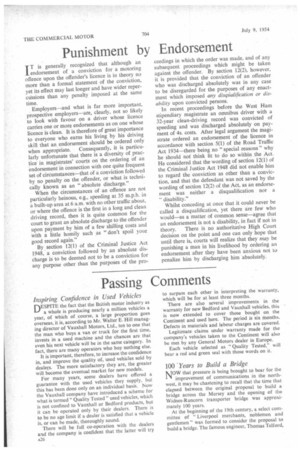Punishment by Endorsement
Page 28

If you've noticed an error in this article please click here to report it so we can fix it.
T T is generally recognized that although an 'endorsement of a conviction for a motoring offence upon the offender's licence is in theory no more than a formal statement of the conviction, yet its effect may last longer and have wider reperctissions than any penalty imposed at the same time.
Employers—and what is far more important, prospective employers—are, clearly, not so likely to look with favour on a driver whose licence carries one or more endorsements as on one whose licence is clean. It is therefore of great importance to everyone who earns his living by his driving skill that an endorsement should be ordered only when appropriate. Consequently, it is particularly unfortunate that there is a diversity of practice in magistrates' courts on the ordering of an endorsement in connection with one quite frequent *set of circumstances—that of a conviction followed by no penalty on the offender, or what is technically known as an "absolute discharge."
When the circumstances of an offence are not particularly heinous, e.g., speeding at 35 m.p.h. in a built-up area at 6 a.m. with no other traffic about, or where the offence is the first in a long and clean driving record, then it is quite common for the court to grant an absolute discharge to the offender upon payment by him of a few shilling costs and -with a little homily such as "don't spoil your good record again."
By section 12(1) of the Criminal Justice Act 1948, a conviction followed by an absolute discharge is to be deemed not to be a conviction for any purpose other than the purposes of the pro ceedings in which the order was made, and of any subsequent proceedings which might be taken against the offender. By section 12(2), however, it is provided that the conviction of an offender who was discharged absolutely was in any case to be disregarded for the purposes of any enactment which imposed any disqUalification or disability upon convicted persons.
In recent proceedings before the West Ham stipendiary magistrate an omnibus driver with a 32-year clean-driving record was convicted of speeding and was discharged absolutely on payment of 4s. costs. After legal argument the magistrate ordered an endorsement of the licence in accordance with section 5(1) of the Road Traffic Act 1934—there being no "special reasons" why he should not think fit to do so within the Act. He considered that the wording of section 12(1) of the Criminal Justice Act 1948 did not enable him to regard the conviction• as other than a conviction, and that the defendant was not saved by the wording of section 12(2) of the Act, as an endorsement was neither a disqualification nor a " disability."
Whilst conceding at once that it could never be called a disqualification, yet there are few who would—as a matter of common sense—agree that an endorsement is not a disability, in fact if not in theory. There is no authoritative High Court decision on the point and one can only hope that until there is, courts will realize that they may be punishing a man in his livelihood by ordering an endorsement after they have been anxious not to penalize him by discharging him absolutely.




























































































